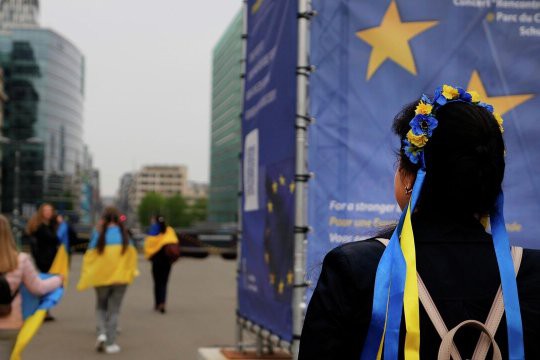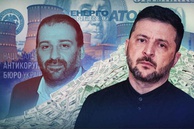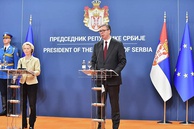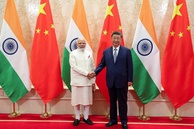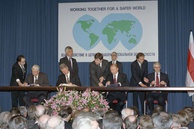The painful process of building a Ukrainian nation as a self-reliant ethno-political entity gives rise to a host of wild legal initiatives, resulting from stability-lacking Ukrainian statehood.
A petition demanding an 8-year sentence for abusive treatment of citizens “who acknowledge their belonging to the Ukrainian nation” which has been posted on the website of the Ukrainian president is now waiting for 25,000 votes needed for it to be put under consideration. Needless to say, an affront on the dignity of a nation is despicable and unacceptable.
The national issue in Ukraine is as hot as ever, regardless of whether the initiative in question will garner the required number of supporters or not. According to the petition, the concept “Ukrainian nation” has been formalized into a legally recognized definition, and thus the text of the petition identifies it as "citizens who acknowledge their belonging to the Ukrainian nation”.
The concept “Ukrainian nation” is devoid of legal substance because it lacks consistent criteria by which an individual can be identified as belonging to it. The policy of building a political nation in independent Ukraine has resulted in a situation when, from a formal point of view, all holders of Ukrainian citizenship regardless of nationality are pronounced Ukrainians. Kyiv was hoping that this will speed up the process of Ukrainization of the country’s multi-national population, inherited by Ukraine from the Soviet Union.
As a result, it has elaborated the political framework of this process, whereas the ethnic one remains incomplete. There is no clear answer to the question: who are to be considered Ukrainians? Those who speak Ukrainian? But people speak Ukrainian in border areas of Russia, and many of these speakers do not consider themselves Ukrainians. Those who speak Ukrainian and reside in Ukraine? But Ukraine is home to Ukrainian-speaking ethnic Russians, Rumanians, Poles, Jews, Slovakians, etc.
Should we consider those who speak Russian Ukrainians? Some Russian speakers consider themselves Russian-speaking Ukrainians. Does it mean that the Ukrainian nation is, at least, bilingual? But all Ukrainian laws deny this identifying the Ukrainian language as the only officially recognized marker of Ukrainian statehood and identity. Consequently, Russian-speaking citizens of Ukraine who consider themselves Ukrainians are false Ukrainians? For the maltreatment of which part of the Ukrainian nation does the above petition threaten: the Ukrainian-speaking, the Russian-speaking, or both? The Russian-speaking part of Ukrainian citizens have been abused throughout the entire Ukrainian independence without any legal consequences. And, in many cases, Ukrainians who left Ukraine for the West, speak Russian there.
In present-day reality, the ‘sacred cow’ is solely the Ukrainian-speaking part of the Ukrainian nation. Such pleonasm is normal for Ukraine, since, through the efforts of Kyiv authorities, the concept “Ukrainian” is filled, primarily, with political, rather than ethnic, meaning. To be acknowledged a Ukrainian, one must practice a whole range of political convictions, and first of all, Russophobia.
From the historical point of view, political Ukrainism is a relatively recent phenomenon having appeared a couple of centuries ago, whereas the people who reside in what we now know as Ukraine lived there well before that, singing same songs, speaking approximately the same language, without any shade of nationalistic colour inculcated today. This supports the fact that Ukraine without political Ukrainism is quite possible and a historically known phenomenon. (2).
But the Kyiv regime cannot exist without this ideologeme. The idea of a Ukrainian nation they are trying to inculcate is a prerequisite for their political career and they call for an 8-year prison sentence for abusing this not-yet-fledged phenomenon. Given that such an idea of a Ukrainian nation does not match the ethnic and political realities of the Ukrainian state, they push for it using repressive measures like in Nazi Italy.
Italy of the 1920s saw a totalitarian dictatorship: opposition parties were dispelled, independent press was banned, opponents to the regime were arrested or escaped. A secret squad dealt with persecution and punishment of the differently-minded. The same situation is currently observed in Ukraine, where the dictatorship has a local ethno-political and nationalistic colour.
Positioned at the junction of Russian-Polish cultural influence, Ukraine is experiencing the impact of both, and, depending on the propaganda and the imposed geopolitical policy, it opts for one of the two, proceeding not from the cultural or historical closeness (in this case, it would always choose the Russian culture), but from political likes or dislikes.
Through Poland, the West is saturating the Ukrainian society with Russophobic moods. This cannot but entail a rise in domestic tension, since the Ukrainian society is being transformed into a parrot that has Russian origin but Polish feather color.
A Polish politician of the first quarter of the 20th century, Roman Dmowski, predicted a sad future for independent Ukraine, since “young nations…..due to lack of traditions, concepts and instincts which turn a mass into a nation, and also for the absence of political and managerial experience, often run into insolvable problems as they enter independent existence... The Russian people, with their historical traditions and prominent state instinct, ….did find a way to address these problems. The new Ukrainian people will have to quickly find a way to cope with this task too, but they will quickly realize that it is beyond their power”.
When a mass cannot be transformed into a people, it is made into a nation. Fully aware of the fragility of such an entity, they threaten anyone who doubts its political purpose with imprisonment.
- https://lenta.ru/news/2023/07/13/petition/
- https://odnarodyna.org/article/dayosh-ukrainu-bez-ukrainstva
- Dmowski Roman Świat powojenny i Polska (M.Niklewicz, J. Załuska, 1931)
read more in our Telegram-channel https://t.me/The_International_Affairs

 11:15 20.07.2023 •
11:15 20.07.2023 •
